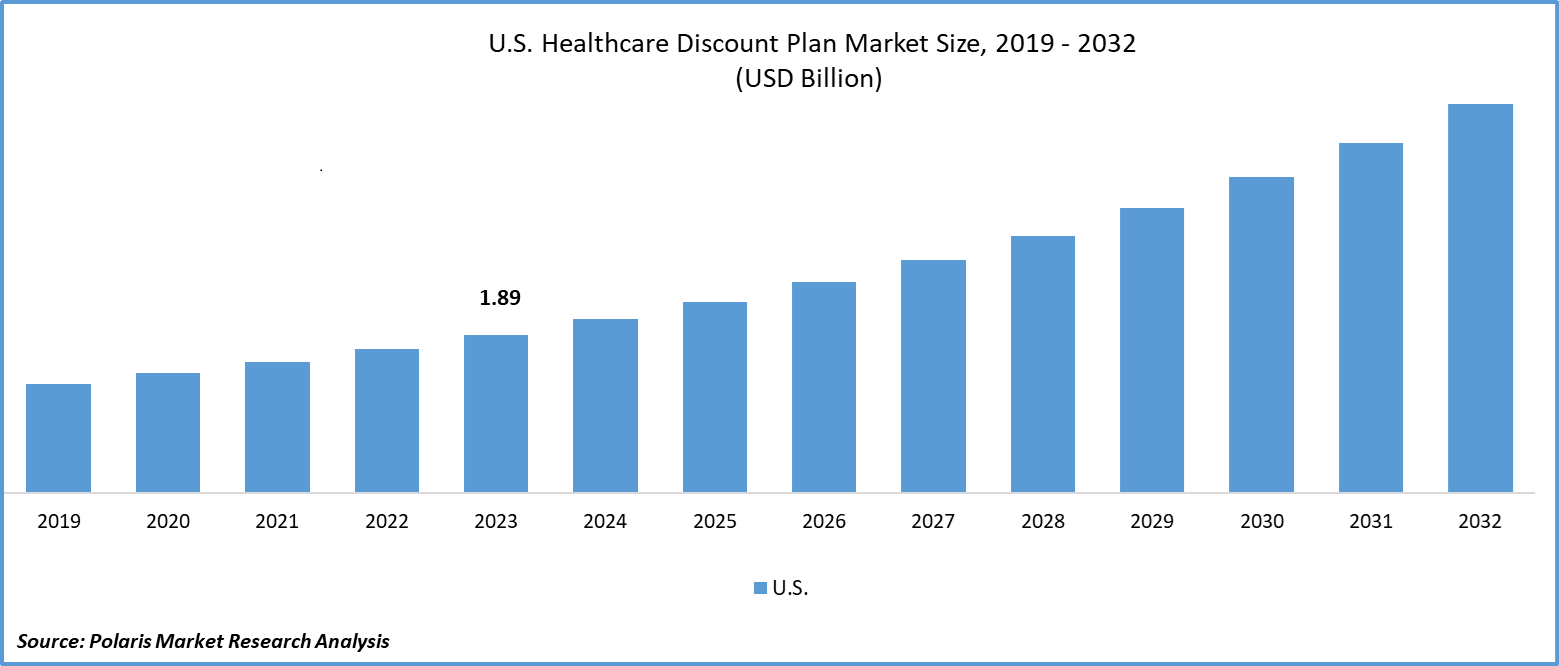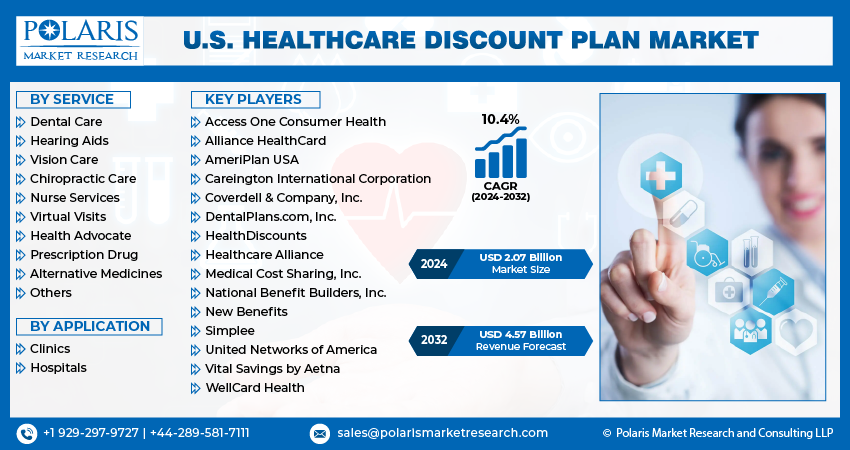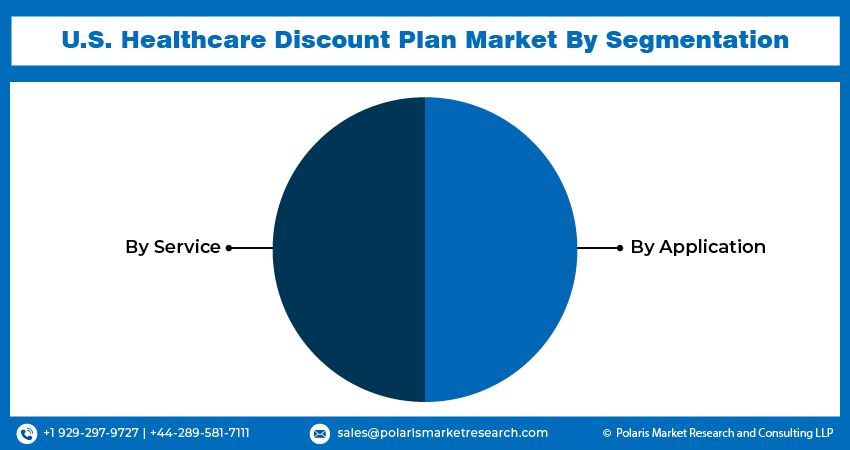
U.S. Healthcare Discount Plan Market Share, Size, Trends, Industry Analysis Report, By Service (Dental Care, Hearing Aids, Vision Care, Chiropractic Care, Nurse Services, Virtual Visits, Health Advocate, Prescription Drug, Alternative Medicines, and Others); By Application; Segment Forecast, 2024 - 2032
- Published Date:Mar-2024
- Pages: 120
- Format: PDF
- Report ID: PM4734
- Base Year: 2023
- Historical Data: 2019-2022
Report Outlook
The U.S. healthcare discount plan market was valued at USD 1.89 billion in 2023 and is expected to grow at a CAGR of 10.4% during the forecast period.
The U.S. healthcare discount plan market has become a significant player in the healthcare landscape, offering an alternative approach to accessing medical services at reduced costs. In the U.S., the healthcare system grapples with growing challenges regarding both cost and accessibility. Healthcare discount plans offer a valuable remedy by providing discounted rates across a wide array of medical services. This directly contributes to making healthcare more attainable for individuals and families who may not possess comprehensive insurance coverage.
Escalating healthcare expenses have placed a burden on the finances of numerous Americans. Healthcare discount plans play a pivotal role in alleviating the financial strain by reducing out-of-pocket costs for medical care. This provides much-needed relief for individuals and families contending with budgetary constraints.

To Understand More About this Research:Request a Free Sample Report
Moreover, healthcare discount plans frequently encompass advantages pertaining to preventive care, including check-ups, screenings, and wellness programs. This encourages individuals to adopt a proactive stance towards their health, facilitating early detection and management of potential health issues.
- For instance, in February 2023, Amazon has successfully finalized its acquisition of One Medical. This partnership aims to provide superior healthcare to a larger audience, striving for improved health outcomes, enhanced care experiences, and greater value, all within a more cohesive and effective care team setting.
The U.S. healthcare discount plan market is poised for continued growth, driven by factors such as rising healthcare costs, limited insurance coverage, and a shift towards consumer-centric healthcare. While facing challenges related to regulatory compliance and scope limitations, the industry's potential for a positive impact on healthcare accessibility and affordability is significant. By capitalizing on opportunities for technological integration, customization, and strategic partnerships, providers can further shape and strengthen this evolving market.
Growth Drivers
- Increasing healthcare cost is projected to spur the product demand.
The continuous rise in healthcare costs has been a significant driver of the healthcare discount plan market. As individuals seek ways to mitigate the financial impact of medical expenses, these plans offer a practical solution by providing discounts on a wide range of healthcare services.
Many Americans have limited or no insurance coverage, leaving them vulnerable to high healthcare expenses. Healthcare discount plans provide an accessible option for individuals who do not have comprehensive insurance plans, allowing them to access medical services at reduced rates.
Moreover, there has been a notable shift in the healthcare landscape towards consumer-driven healthcare choices. Healthcare discount plans align with this trend by offering transparent pricing and a more direct approach to obtaining medical services, resonating with individuals seeking greater control over their healthcare decisions.

Report Segmentation
The market is primarily segmented based on service, and application.
|
By Service |
By Application |
|
|
To Understand the Scope of this Report:Speak to Analyst
By Service Analysis
- Virtual visits segment is expected to witness highest growth during forecast period
The virtual visits segment within the healthcare discount plan market has experienced robust growth in recent years. The virtual visits segment in the U.S. healthcare discount plan market has witnessed remarkable growth in recent years, spurred by the advent of telemedicine technology, which has revolutionized healthcare delivery, allowing patients to connect with healthcare providers remotely. Healthcare discount plans have recognized the potential of virtual visits in enhancing accessibility and reducing costs, thus incorporating this service into their offerings.
Moreover, the COVID-19 pandemic accelerated the adoption of virtual visits as a safe and convenient means of receiving medical care. This heightened acceptance has led to an increased demand for healthcare discount plans that include virtual visit benefits. Additionally, virtual visits address geographical barriers, particularly for individuals residing in remote or underserved areas. This technology allows them to access quality healthcare without the need for extensive travel or inconvenience.
Furthermore, virtual visits offer a cost-effective alternative to in-person consultations, reducing expenses related to transportation and potential time off work. Healthcare discount plans recognizing these benefits have expanded their coverage to include virtual visits, attracting a wider customer base. However, challenges persist, including the need for robust telemedicine infrastructure, ensuring patient privacy and data security, and regulatory compliance. Despite these hurdles, the growth of the virtual visits segment in the U.S. healthcare discount plan market signifies a shift towards more accessible, convenient, and cost-effective healthcare solutions for Americans.
By Application Analysis
- Clinics segment accounted for the largest market share in 2023
The clinics segment in the healthcare discount plan market has witnessed substantial growth due to various contributing factors. The clinics segment within the U.S. healthcare discount plan market has experienced significant growth in recent years, driven by clinics being increasingly seen as vital healthcare hubs, providing a wide range of essential services, from primary care to specialized treatments. Healthcare discount plans recognize the value of including clinics in their network, as they offer accessible and cost-effective care options.
Furthermore, clinics often serve as a convenient first point of contact for individuals seeking medical attention. With their ability to address a diverse array of healthcare needs, clinics have become integral in the efforts to improve healthcare accessibility.
Moreover, the COVID-19 pandemic underscored the importance of accessible healthcare facilities, with clinics playing a crucial role in managing and treating various health concerns. This increased recognition of clinics' significance has further fueled their growth within the healthcare discount plan market.
Additionally, clinics tend to have lower overhead costs compared to larger medical facilities, allowing them to offer services at more competitive rates. This cost-effectiveness aligns well with the value proposition of healthcare discount plans, making clinics a strategic inclusion in their provider networks.

Key Market Players & Competitive Insights
The U.S. healthcare discount plan market is fragmented and is anticipated to witness competition due to several players' presence. Major service providers in the market are constantly upgrading their technologies to stay ahead of the competition and to ensure efficiency, integrity, and safety. These players focus on partnership, product upgrades, and collaboration to gain a competitive edge over their peers and capture a significant market share.
Some of the major players operating in the U.S. market include:
- Access One Consumer Health
- Alliance HealthCard
- AmeriPlan USA
- Careington International Corporation
- Coverdell & Company, Inc.
- DentalPlans.com, Inc.
- HealthDiscounts
- Healthcare Alliance
- Medical Cost Sharing, Inc.
- National Benefit Builders, Inc.
- New Benefits
- Simplee
- United Networks of America
- Vital Savings by Aetna
- WellCard Health
Recent Developments
- In January 2022, Membersy, the dental subscription platform, introduced a direct-to-consumer (D2C) marketplace known as membersy Marketplace. This platform offers licensed dental membership plans provided by various Dental Service Organizations (DSOs) across the country.
U.S. Healthcare Discount Plan Market Report Scope
|
Report Attributes |
Details |
|
Market size value in 2024 |
USD 2.07 billion |
|
Revenue forecast in 2032 |
USD 4.57 billion |
|
CAGR |
10.4% from 2024 – 2032 |
|
Base year |
2023 |
|
Historical data |
2019 – 2022 |
|
Forecast period |
2024 – 2032 |
|
Quantitative units |
Revenue in USD billion and CAGR from 2024 to 2032 |
|
Segments covered |
By Service, By Application |
|
Customization |
Report customization as per your requirements with respect to segmentation. |
FAQ's
The key companies in U.S. Healthcare Discount Plan Market AmeriPlan USA, Careington International Corporation, Coverdell & Company, Inc
The U.S. healthcare discount plan market is expected to grow at a CAGR of 10.4% during the forecast period.
U.S. Healthcare Discount Plan Market report covering key segments are service, and application.
The key driving factors in U.S. Healthcare Discount Plan Market are Increasing healthcare cost is projected to spur the product demand
U.S. Healthcare Discount Plan Market Size Worth $ 4.57 Billion By 2032
